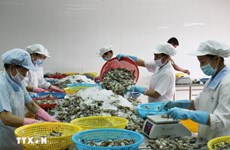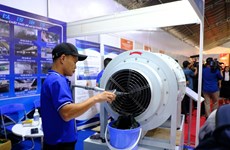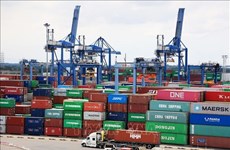Magnesium phosphate production outstrips demand
Vietnam’s fertiliser production has so
far met 100 percent of domestic demand for fused calcium magnesium
phosphate and a half of the demand of urea fertiliser, the Ministry of
Agriculture and Rural Development (MARD) has said.
Vietnam’s fertiliser production has so
far met 100 percent of domestic demand for fused calcium magnesium
phosphate and a half of the demand of urea fertiliser, the Ministry of
Agriculture and Rural Development (MARD) has said.
According to the ministry’s report, delivered at a seminar on the potential of the fertiliser market held in Hanoi on July 15, Vietnam now has about 300 fertiliser producers. Every year, the country produces around 1 million tonnes of phosphate, including 520,000-550,000 tonnes of magnesium phosphate.
With such a capacity, the country is also able to export phosphate and NPK fertiliser to Japan, Australia, Malaysia, Taiwan, Thailand, the Philippines and Indonesia .
However, the country still has to import other fertilisers such as potassium and diammonium phosphate (DAP).
This year, domestic demand for fertiliser is estimated at about 7.8 million tonnes, including 1.7 million tonnes of urea fertiliser, 1.85 million tonnes of NPK, and 700,000 tonnes of DAP.
By the end of the second quarter of this year, Vietnam had imported 2.1 million tonnes of fertiliser worth 665 million USD, a decrease of 6.6 percent in volume and 60 percent in value as compared with the last year’s figures thanks to the lower prices of imported fertiliser.
China is now Vietnam ’s main fertiliser supplier, providing 40 percent of the latter’s total import volume.
At the seminar, which was held by the Information Centre for Agriculture and Rural Development (AGROINFO), agricultural experts analysed and discussed factors that may have an impact on Vietnam’s fertiliser market.
AGROINFO’s Truong Hong Kim said the supply for the domestic market is expected to be plentiful in the second half of this year. However, she warned that the prices may rise slightly due to fluctuations in the import prices of crude oil and coal on the world market, as well the affects of tax policies.
On the contrary, a producer, the Vietnam-Japan Fertiliser Company, said that the domestic fertiliser prices can not be raised, as farmers have seen a decrease in prices fetched for their products, making them more careful when planning investment in production development.
In addition to fertiliser, AGROINFO also plans to organise a number of seminars on the development of the markets for five other items: livestock feed, rice, aquatic products, insecticide, and meats and foodstuffs.
The centre expects such seminars will help businesses and farmers to update information on prices, markets and the supply and demand of each item, aiding growers to come up with effective and rational plans for production, particularly in the context of global economic crisis, AGROINFO Director Pham Quang Dieu stressed./.
According to the ministry’s report, delivered at a seminar on the potential of the fertiliser market held in Hanoi on July 15, Vietnam now has about 300 fertiliser producers. Every year, the country produces around 1 million tonnes of phosphate, including 520,000-550,000 tonnes of magnesium phosphate.
With such a capacity, the country is also able to export phosphate and NPK fertiliser to Japan, Australia, Malaysia, Taiwan, Thailand, the Philippines and Indonesia .
However, the country still has to import other fertilisers such as potassium and diammonium phosphate (DAP).
This year, domestic demand for fertiliser is estimated at about 7.8 million tonnes, including 1.7 million tonnes of urea fertiliser, 1.85 million tonnes of NPK, and 700,000 tonnes of DAP.
By the end of the second quarter of this year, Vietnam had imported 2.1 million tonnes of fertiliser worth 665 million USD, a decrease of 6.6 percent in volume and 60 percent in value as compared with the last year’s figures thanks to the lower prices of imported fertiliser.
China is now Vietnam ’s main fertiliser supplier, providing 40 percent of the latter’s total import volume.
At the seminar, which was held by the Information Centre for Agriculture and Rural Development (AGROINFO), agricultural experts analysed and discussed factors that may have an impact on Vietnam’s fertiliser market.
AGROINFO’s Truong Hong Kim said the supply for the domestic market is expected to be plentiful in the second half of this year. However, she warned that the prices may rise slightly due to fluctuations in the import prices of crude oil and coal on the world market, as well the affects of tax policies.
On the contrary, a producer, the Vietnam-Japan Fertiliser Company, said that the domestic fertiliser prices can not be raised, as farmers have seen a decrease in prices fetched for their products, making them more careful when planning investment in production development.
In addition to fertiliser, AGROINFO also plans to organise a number of seminars on the development of the markets for five other items: livestock feed, rice, aquatic products, insecticide, and meats and foodstuffs.
The centre expects such seminars will help businesses and farmers to update information on prices, markets and the supply and demand of each item, aiding growers to come up with effective and rational plans for production, particularly in the context of global economic crisis, AGROINFO Director Pham Quang Dieu stressed./.













